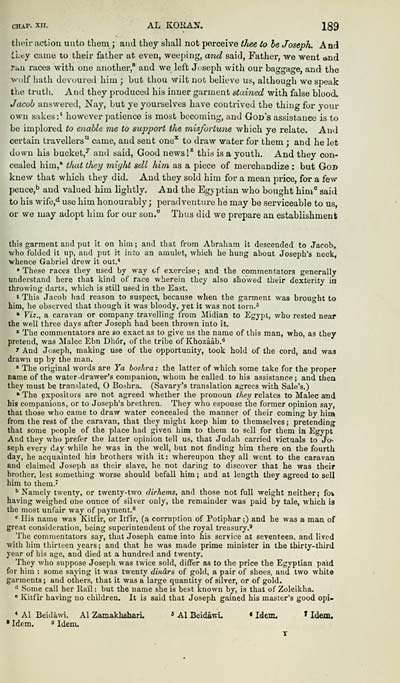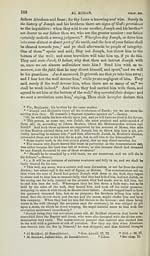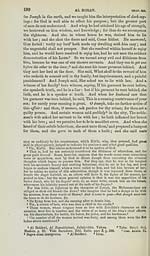Download files
Complete book:
Individual page:
Thumbnail gallery: Grid view | List view

CHAP. XII. AL KOllA^f. 189
their action uuto tliem ; and they shall not porceive thee to he Joseph. And
t'i.cy came to their father at even, weeping, and said, Father, we went and
Tun races with one another,* and we left Joseph with our baggage, and the
v'olf hath devoured him ; but thou wilt not believe us, although we speak
tliC truth. And they produced his inner garment stained with false blood.
Jacob answered, Nay, but ye yourselves have contrived the thing for your
own sakes:' however patience is most becoming, and God's assistance is to
be implored to enable me to support the misfortune which ye relate. And
certain travellers" came, and sent one^ to draw water for them j and he let
down his bucket/ and said, Good news!^ this is a youth. And they con-
cealed him,* that ihey might sell him as a piece of merchandize : but Gob
knew that which they did. And they sold him for a mean price, for a few
pence,'' and valued him lightly. And the Egyptian who bought him° said
to his wife,<^ use him honourably; perad venture he may be serviceable to us,
or we may adopt him for our son.® Thus did we prepare an establishment
this garment and put it on him ; and that from Abraham it descended to Jacob,
who folded it up, and put it into an amulet, which he hung about Joseph's neck,
whence Gabriel drew it out.*
» These races they used by way cf exercise ; and the commentators generally
understand here that kind of race wherein they also showed their dexterity in
throwing darts, which is still used in the East.
t This Jacob had reason to suspect, because when the garment was brought to
him, he observed that though it was bloody, yet it was not torn.*
" Viz., a caravan or company travelling from Midian to Egypt, who rested near
the well three days after Joseph had been thrown into it.
^ The commentators are so exact as to give us the name of this man, who, as they
pretend, was Malec Ebn Dhor, of the tribe of Khozaab.^
y And Joseph, making use of the opportunity, took hold of the cord, and was
drawn up by the man.
• The original words are Ya boshra : the latter of which some take for the proper
name of the water -drawer's companion, whom he called to his assistance; and then
they must be translated, O Boshra. (Savary's translation agrees with Sale's.)
• The expositors are not agreed whether the pronoun they relates to Make and
his companions, or to Joseph's brethren. They who espouse the former opinion say,
that those who came to draw water concealed the manner of their coming by hiia
from the rest of the caravan, that they might keep him to themselves ; pretending
that some people of the place had given him to them to sell for them in Egypt
And they who prefer the latter opinion tell us, that Judah carried victuals to Jo-
seph every d^y while he was in the well, but not finding him there on the fourth
day, he acquainted his brothers with it: whereupon they all went to the caravan
and claimed Joseph as their slave, he not daring to discover that he was their
brother, lest something worse should befall him ; and at length they agreed to sell
him to them."
'' Namely twenty, or twenty-two dirhems, and those not full weight neither; foi
having weighed one ounce of silver only, the remainder was paid by tale, which is
the most unfair way of payment.^
' His name was Kitfir, or Itfir, (a corruption of Potiphar ;) and he was a man of
great consideration, being superintendent of the royal treasury.*
The commentators say, that Joseph came into his service at seventeen, and lived
with him thirteen years ; and that he was made prime mini.ster in the thirty-third
year of his age, and died at a hundred and twenty.
They who suppose Joseph was twice sold, differ as to the price the Egyptian paid
for him : some saying it was twenty dinars of gold, a pair of shoes, and two white
garments ; and others, that it was a large quantity of silver, or of gold.
•^ Some call her Rail : but the name she is best known by, is that of Zoleikha.
' Kitfir having no children. It is said that Joseph gained his master's good opi-
• Al Beidawi. Al Zamakhsharu * Al BeidawL « Idenii ' Idem,
» Idem. » Idem.
their action uuto tliem ; and they shall not porceive thee to he Joseph. And
t'i.cy came to their father at even, weeping, and said, Father, we went and
Tun races with one another,* and we left Joseph with our baggage, and the
v'olf hath devoured him ; but thou wilt not believe us, although we speak
tliC truth. And they produced his inner garment stained with false blood.
Jacob answered, Nay, but ye yourselves have contrived the thing for your
own sakes:' however patience is most becoming, and God's assistance is to
be implored to enable me to support the misfortune which ye relate. And
certain travellers" came, and sent one^ to draw water for them j and he let
down his bucket/ and said, Good news!^ this is a youth. And they con-
cealed him,* that ihey might sell him as a piece of merchandize : but Gob
knew that which they did. And they sold him for a mean price, for a few
pence,'' and valued him lightly. And the Egyptian who bought him° said
to his wife,<^ use him honourably; perad venture he may be serviceable to us,
or we may adopt him for our son.® Thus did we prepare an establishment
this garment and put it on him ; and that from Abraham it descended to Jacob,
who folded it up, and put it into an amulet, which he hung about Joseph's neck,
whence Gabriel drew it out.*
» These races they used by way cf exercise ; and the commentators generally
understand here that kind of race wherein they also showed their dexterity in
throwing darts, which is still used in the East.
t This Jacob had reason to suspect, because when the garment was brought to
him, he observed that though it was bloody, yet it was not torn.*
" Viz., a caravan or company travelling from Midian to Egypt, who rested near
the well three days after Joseph had been thrown into it.
^ The commentators are so exact as to give us the name of this man, who, as they
pretend, was Malec Ebn Dhor, of the tribe of Khozaab.^
y And Joseph, making use of the opportunity, took hold of the cord, and was
drawn up by the man.
• The original words are Ya boshra : the latter of which some take for the proper
name of the water -drawer's companion, whom he called to his assistance; and then
they must be translated, O Boshra. (Savary's translation agrees with Sale's.)
• The expositors are not agreed whether the pronoun they relates to Make and
his companions, or to Joseph's brethren. They who espouse the former opinion say,
that those who came to draw water concealed the manner of their coming by hiia
from the rest of the caravan, that they might keep him to themselves ; pretending
that some people of the place had given him to them to sell for them in Egypt
And they who prefer the latter opinion tell us, that Judah carried victuals to Jo-
seph every d^y while he was in the well, but not finding him there on the fourth
day, he acquainted his brothers with it: whereupon they all went to the caravan
and claimed Joseph as their slave, he not daring to discover that he was their
brother, lest something worse should befall him ; and at length they agreed to sell
him to them."
'' Namely twenty, or twenty-two dirhems, and those not full weight neither; foi
having weighed one ounce of silver only, the remainder was paid by tale, which is
the most unfair way of payment.^
' His name was Kitfir, or Itfir, (a corruption of Potiphar ;) and he was a man of
great consideration, being superintendent of the royal treasury.*
The commentators say, that Joseph came into his service at seventeen, and lived
with him thirteen years ; and that he was made prime mini.ster in the thirty-third
year of his age, and died at a hundred and twenty.
They who suppose Joseph was twice sold, differ as to the price the Egyptian paid
for him : some saying it was twenty dinars of gold, a pair of shoes, and two white
garments ; and others, that it was a large quantity of silver, or of gold.
•^ Some call her Rail : but the name she is best known by, is that of Zoleikha.
' Kitfir having no children. It is said that Joseph gained his master's good opi-
• Al Beidawi. Al Zamakhsharu * Al BeidawL « Idenii ' Idem,
» Idem. » Idem.
Set display mode to: Large image | Transcription
Images and transcriptions on this page, including medium image downloads, may be used under the Creative Commons Attribution 4.0 International Licence unless otherwise stated. ![]()
| Early Gaelic Book Collections > J. F. Campbell Collection > Koran: or, Alcoran of Mohammed > (343) |
|---|
| Permanent URL | https://digital.nls.uk/77137868 |
|---|
| Description | Volumes from a collection of 610 books rich in Highland folklore, Ossianic literature and other Celtic subjects. Many of the books annotated by John Francis Campbell of Islay, who assembled the collection. |
|---|
| Description | Selected items from five 'Special and Named Printed Collections'. Includes books in Gaelic and other Celtic languages, works about the Gaels, their languages, literature, culture and history. |
|---|

